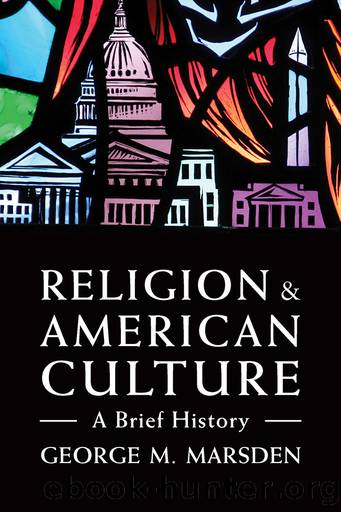Religion and American Culture by George M. Marsden

Author:George M. Marsden
Language: eng
Format: epub
Publisher: Eerdmans
CHAPTER 6
Keeping the Faith in Modern Times
Our Country is filled with a Socialistic, I.W.W., Communistic, radical, lawless, anti-American, anti-church, anti-God, anti-marriage gang, and they are laying the eggs of rebellion and unrest in labor and capital and home, and we have some of them in our universities. . . . If this radical element could have their way, my friends, the laws of nature would be repealed, or they would reverse them; oil and water would mix; the turtle dove would marry the turkey buzzard; the sun would rise in the West and set in the East, chickens would crow and the roosters would squeal; cats would bark and dogs would meow; the least would be the greatest, a part would be greater than the whole; yesterday would be after tomorrow if this crowd were in control.
Billy Sunday (1925)
Both our practical morality and our emotional lives are adjusted to a world which no longer exists.
Joseph Wood Krutch, The Modern Temper (1929)
Traditional Protestantism, Cultural Dominance, or Both?
During the early twentieth century, while outsider groups of Protestants were debating how much to assimilate with mainstream American society, insider Protestants were struggling over how to relate to a changing American society. Even if one belonged to a long-established Protestant church, such as Methodist, Baptist, Presbyterian, or Congregationalist, and were from long-Americanized British, or perhaps German, ethnic stock, one was still confronted with the issue of how Christians should relate to an increasingly pluralistic and secular society. For the leadership in such groups, one practical question was whether these groups could continue to dominate American life. If so, could they retain their traditional Protestant beliefs? Or would they have to modify and broaden those beliefs both in order to remain current with prevailing opinion and to continue their cultural influence?
The reason this was an either-or choice was simple. Traditional Protestantism, like almost all other Judeo-Christian religions, is exclusivist. It teaches that some people will be saved for eternal life and some will not. Moreover, differences regarding morality are not simply matters of preference but reflect the perceived will of God. The total dominance of such views in a society would lead to an exclusivist, God-centered society like early Puritanism. In the United States, however, Protestant views had a more informal dominance. They retained an impact on public life through some concessions to a limited pluralism. That is, within the boundaries of a broadly Judeo-Christian moral consensus, some alternate views were tolerated and civil government was not based explicitly on religion. So long as the national heritage was predominantly homogeneous and Protestant, religious and secular views could be easily blended together without great conflict. The public schools, for instance, could teach generally Protestant viewpoints mixed with American Enlightenment ideals.
By the early twentieth century, when the United States was one of the most pluralistic nations on earth, this stance was becoming awkward. Especially awkward were Protestantismâs exclusivist claims. If these were replaced with inclusive teachings, for instance, saying that Christianity is just one of the ways
Download
This site does not store any files on its server. We only index and link to content provided by other sites. Please contact the content providers to delete copyright contents if any and email us, we'll remove relevant links or contents immediately.
The Lost Art of Listening by Michael P. Nichols(6484)
Why I Am Not A Calvinist by Dr. Peter S. Ruckman(3773)
The Rosicrucians by Christopher McIntosh(3057)
Wicca: a guide for the solitary practitioner by Scott Cunningham(2711)
Signature in the Cell: DNA and the Evidence for Intelligent Design by Stephen C. Meyer(2506)
Real Sex by Lauren F. Winner(2481)
The Holy Spirit by Billy Graham(2426)
To Light a Sacred Flame by Silver RavenWolf(2357)
The End of Faith by Sam Harris(2296)
The Gnostic Gospels by Pagels Elaine(2034)
Nine Parts of Desire by Geraldine Brooks(2011)
Waking Up by Sam Harris(1962)
Heavens on Earth by Michael Shermer(1958)
Devil, The by Almond Philip C(1906)
Jesus by Paul Johnson(1892)
The God delusion by Richard Dawkins(1856)
Kundalini by Gopi Krishna(1827)
Chosen by God by R. C. Sproul(1766)
The Nature of Consciousness by Rupert Spira(1692)
